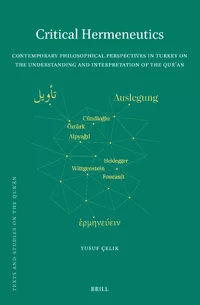Çelik (Yusuf), Critical Hermeneutics. Contemporary Philosophical Perspectives in Turkey on the Understanding and Interpretation of the Qur’an, Leyde, Brill, ("Texts and Studies on the Qurʾān, Volume ; 22"), 2023, 250P. ISBN 978-90-04-53787-3
Author
Yusuf Çelik, Ph.D., is Assistant Professor of Digital Humanities and Islam, and member of the research group Digital Approaches to Sacred Texts at the Vrije Universiteit Amsterdam. He received his Ph.D. from the University of Edinburgh on Qur’anic hermeneutics.

Presentation
The Turkish market of Qur’anic translations and studies is exceedingly oversaturated. Critics find some of these lacking in proper hermeneutical judgment, impelling them to reflect on the conditions of judicious Qur’anic exegesis. These reflections have remained relatively unexplored in English academic literature. In Critical Hermeneutics, Çelik explores and compares the hermeneutical philosophies of three Turkish intellectuals, namely Alpyağıl, Cündioğlu, and Öztürk. By exploring their philosophical views on subjectivity and objectivity in the context of interpreting the Qur’an, Çelik draws major implications for reading the Qur’an in new and different ways.
Contents
Acknowledgements
Notes on Citations
1 Introduction
1 Status of prior Research
2 The Ankara School: History and Hermeneutics
3 A Return to Theoretical Deliberation
4 The Problem of Subjectivity–Objectivity
5 Overall Structure and Conceptual Framework
2 What Is Qurʾanic Hermeneutics?
1 Introduction
2 Körner’s Study of Revisionist Qurʾanic Hermeneutics
3 An Alternative Definition of Qurʾanic Hermeneutics
4 Cross-Cultural Hermeneutics
5 Qurʾanic Hermeneutics and the Statement
6 Conclusion
3 A Case against Subjectivity and Relativism: The Hermeneutics of Dücane Cündioğlu
1 Introduction
2 The Meaning of Understanding the Qurʾan
3 Hermeneutical Beginnings
4 Qurʾanic Hermeneutics and Subjectivity
5 Polysemy, Subjectivity, and the Qurʾan
6 The Natural Relations of Expressions
7 Hermeneutics in Practice
8 The Evaporation of Meaning and the Qurʾan
9 Objectivity, Subjectivity, and the Justification of Interpretations
10 The Qurʾan as a Linguistic Event
11 Lisan and kelam
12 The Diachronic Aspects of Understanding
13 Conclusive Remarks
4 Subjective Bearing Is More Fundamental to Understanding Than Objective Method: The Hermeneutics of Recep Alpyağıl
1 Introduction
2 The Problem of Private Language and Subjectivist Qurʾanic Readings
3 The Qurʾan and Art
4 Seeing-as
5 Faith and History
6 Closing Remarks
5 Between Subjective Scruples and Objective Historical Reconstruction: The Hermeneutics of Mustafa Öztürk
1 Introduction
2 Rehabilitating the Historical
3 The Two Stages of Interpretation: Reconstruction and Mediation
4 Reconstruction: An Archaeology of Meaning
5 Mediation
6 The Inescapable Particularity of Narratives
7 Rediscovering God
8 The Teleology of the Sharīʿa
9 Responding to Criticism
10 The Ethics of Interpretative Claims
11 Guarding the Lines between taḥrīf and taʾwīl
12 Concluding Remarks
6 Truth, Subjectivity, and Method
1 Introduction
2 Truth and Spirituality
3 Subjectivity and Truth
4 Objectivity and Language
5 Conclusion
7 Surplus and Futurity of Meaning: The Status of New and Divergent Readings of the Qurʾan
1 Introduction
2 The Surplus of Meaning and the Double Significance of Symbols
3 Excess and Futurity
4 The Surplus and Futurity of Meaning in Turkish Qurʾan Hermeneutics
5 Conclusion
8 Final Reflections on the State of Qurʾanic Hermeneutics in Turkey
Bibliography
Index
